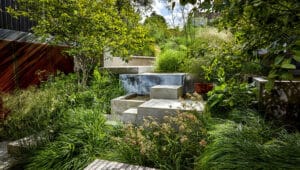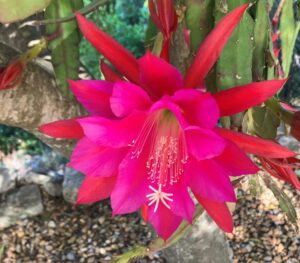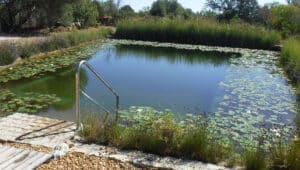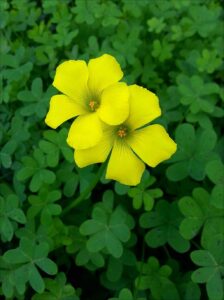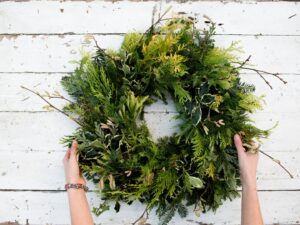THE ALGARVE is changing as more of us strive for a lifestyle of ‘holiday’ homes and hi-tech construction. But are we guilty of taking this beautiful area, and our environment, for granted?
Not many of us want a dry, overgrown, unattended garden that might detract from the value of our homes! But as in the words of the great garden traveller, Monty Don, the best gardens are those offering ‘practical beauty’.
The more lawn you have, the more costly your garden is to maintain. Whether you live in a condominium or a private villa the same rule applies. Not only is there an ongoing cost, but imagine if there really was a problem with the water supply, or salt in the bore hole – would your garden, let alone your lawn, survive? In this region it has been known for whole gardens to be destroyed due to salt or drought.
It is, however, possible to find a balance with nature and our idea of perfection; if we can only begin to appreciate that Algarve homes don’t have to be totally surrounded by perfect lawns to make them worth more. Indeed, the villa with the water efficient garden should command a higher property value than the one without!
If we take seriously our responsibility for nature and the preservation of water, there are a number of actions that we can take to stop water loss and the risk of salt poisoning:
Alter all or part of your garden. Now is a good time to start planning for changes during the autumn and winter months. Most garden centres have a design department for the construction or reconstruction of gardens and it will cost you little or nothing to ask for a proposal. You could:
1. Replant your garden: Use a part, or all, of your garden to include native grass and wildflowers.
2. Reorganise the plants: Bring together areas of individual trees and flowerbeds to better organise irrigation.
3. Create a feature: Add a pond, patio, path, gravelled play area, or island bed.
4. Grow your own: Why not!?
5. Use natural barriers:
Frame the garden and encourage wildlife.
6. Plan in advance: Think carefully about the irrigation system at the same time as planning a new home or making major alterations.
General tips:
Use indigenous plants. Local Algarvian plants are ideal and are categorised as plants used in Mediterranean gardens. Good choices include the Mastic tree (Pistacia lentiscus); Broom shrub (Genista hirsuta); Bridal veil broom (Retama monosperma); Salgadeira (Atriplex halimus L.); Lavender (Lavandula pedunculata), and Rosemary (Rosmarinus officinalis). Ensure you have all of these plants in your garden. They are extremely important for the habitat and food of the native Algarve fauna; and don’t forget extra food for the birds in the winter!
Add some shade. Add a large plant or tree, or even a pergola. The most appropriate trees for the Algarve garden include the Carob (Ceratonia siliqua); Olive (Olea europaea); Umbrella Pine (Pinus pinea); Aleppo Pine (Pinus halepensis) –There is no longer a danger from the caterpillar as trees are now treated biologically and infestation is well controlled!; Oak (Quercus – for alcaline soil) and Cork Oak (Quercus suber – for acid soil). Remember that we live in a Mediterranean climate, not a tropical one so make your choices wisely!
Add mulch, compost or other ground cover. Gravels, barks, manures, straw, certain tree leaves and some types of plants.
Adjust automatic irrigation regularly. Ask your gardener or expert to adjust the controls to allow for changes in the weather.
Try new technology. Ask a good garden centre for advice.
Water at the right times of day: On windy and sunny days the evaporation can be up to 50per cent! Early morning and late evening irrigation will reduce the loss.
Use greywater and collect rainwater. Water from showers, baths or the washing up can be used as long as the water is fresh and cool, and contains little or no residue from cleaning products. Many new homes are eco-friendly.
Use the right plants in vases or pots. Try to choose plants that are more water friendly!
Put plants in the right places. Understand your garden’s microclimate to choose the right spot for a plant and avoid over-watered areas.
Feed the plants. Get better growth from using less water and adding more nourishment.
Use salt resistant plants. Planting more resilient species, and make regular tests of the water supply.
Again, clever garden construction can help to overcome the risk of water pollution or no water at all.
Remember your plants need exactly the amount of water you give them – make them appreciate it. A good soak occasionally instead of constant sprinkling will help root growth too!
Plant of the month:
Oleander (Nerium oleander) is a plant of great resistance that comes in various forms as a high tree or compact for hedging. Colours include pink, red, white and yellow and flowers all summer until September. The plants, which have toxic properties, grow from 2 to 6m high. They are very popular decorative plants and are widely used In the Algarve.


